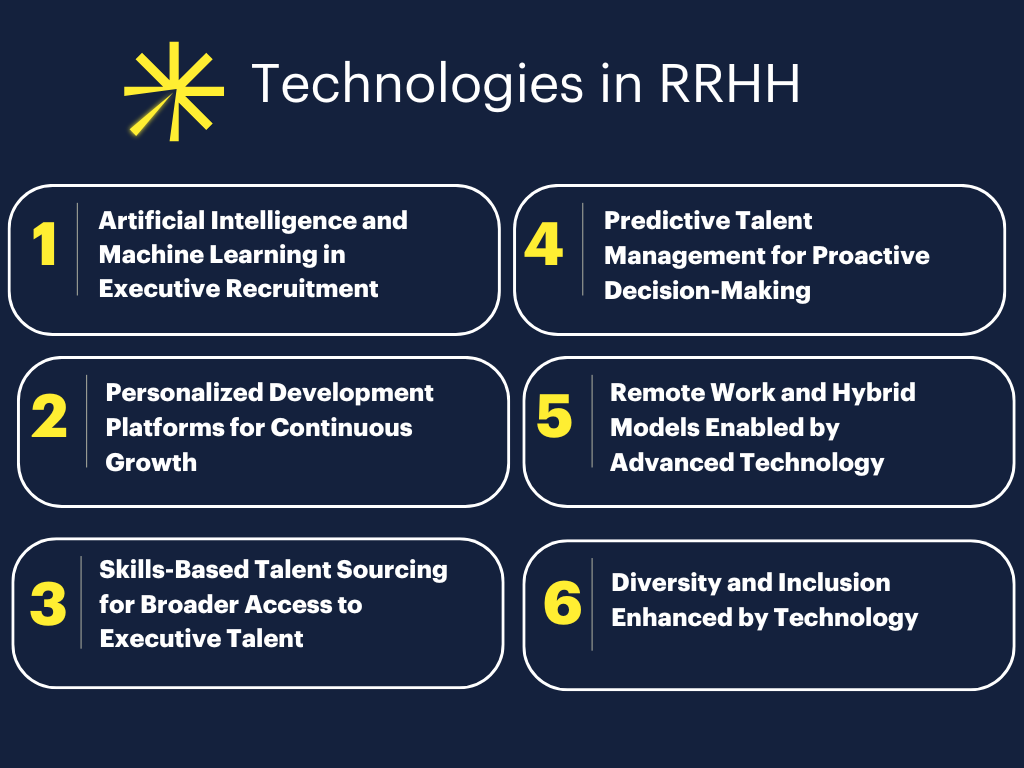Digital transformation has rapidly reshaped HR practices, leading to groundbreaking changes in how talent and employee experience are managed. Tools like artificial intelligence (AI), machine learning (ML), personalized development platforms, and cybersecurity solutions are changing every aspect of the HR sector. In this article we explore the top technology trends shaping the future of HR management as well as the strategic role of HR in executive search and talent acquisition.
Artificial Intelligence and Machine Learning in Executive Search
AI and ML algorithms are changing how executive recruitment is managed by analyzing data to identify patterns and optimize hiring decisions. Advanced HR platforms such as Phenom, Oracle Cloud HCM, SeekOut, and Businessolver analyze not only recruitment trends and skill gaps but also assess social and emotional competencies to select leaders best suited for the development of organizations. It is expected in the following years that these tools will become increasingly sophisticated, enhancing precision and efficiency in executive hiring.
In order to predict gaps and help companies to secure the right type of talent and leadership. Companies using AI and ML in recruitment see up to a 40% faster hiring process and a 30% boost in accuracy, streamlining executive talent acquisition by quickly identifying high-potential candidates (LinkedIn, Deloitte)
Personalized Executive Development Platforms for Continuous Growth
Technology plays a crucial role not only in hiring but also in continuous executive development. Personalized learning platforms use AI to tailor training programs to individual needs, identifying skill gaps and providing relevant content for ongoing learning. Platforms like YouTube, edX, and Udacity are replacing traditional methods, improving corporate development strategies.
In the future, these platforms may integrate virtual and augmented reality, offering immersive learning experiences that enhance executive skills in a dynamic environment. With 83% of business leaders now adopting flexible and dynamic development models, personalized platforms are essential in competitive workplaces.
Skills-Based Talent Sourcing for Broader Access to Executive Talent
A skills-based approach, rather than focusing solely on credentials or specific roles, expands the talent pool, enabling organizations to pinpoint the ideal candidate for executive roles. This model prioritizes skills and potential over academic degrees or specific experience, aligning talent more effectively with organizational needs. Tools like Reejig, retrain.ai, Microsoft, and Cornerstone support this shift by identifying top talent based on demonstrated skills and potential, adding strategic value to executive search efforts.
For example, rather than only focusing on a specific degree, a company might seek candidates with demonstrated leadership skills in crisis management, broadening access to diverse, high-potential talent who excel in critical areas that are needed.
Predictive Talent Management for Proactive Decision-Making in Executive Search efforts
Predictive analytics makes talent management more strategic, especially at the executive level. Advanced predictive tools enable companies to forecast future talent needs, identify high-potential leaders, and pinpoint areas requiring reinforcement.
This process uses data on employee performance, engagement, and career progression to spot patterns, allowing organizations to make proactive decisions that improve retention, succession planning, and onboarding. For example, predictive analytics can help forecast executive retirements and identify internal candidates who, with the right development, could fill these roles seamlessly.
Remote Work and Hybrid Models Enabled by Advanced Technology
The rise of remote work has accelerated development in tools that improve collaboration and productivity in virtual environments. Unified communication platforms, cloud-based project management, and AI-powered time management tools streamline hybrid and remote work models, offering flexibility for distributed executive teams. Advanced technology ensures seamless interaction and optimized workflow, crucial for remote executive management and talent retention.
The global market for remote collaboration tools, driven by platforms like Microsoft Teams, Slack, and Zoom, is set to reach $50.5 billion by 2030 with a growth rate of over 12%. A 2023 McKinsey survey shows 87% of employees prefer remote work at least once weekly, and 58% of executives report improved team performance with hybrid models, highlighting broad support for flexible work.
Diversity and Inclusion Enhanced by Technology
Diversity and inclusion have become strategic imperatives for HR, particularly in executive search. Advanced technology reduces bias in hiring processes, assesses workforce diversity, and fosters an inclusive environment. AI analyzes behavioral patterns to identify and address potential challenges in diversity, promoting a balanced workforce. With 78% of business leaders citing diversity and inclusion as competitive advantages, companies that prioritize these initiatives stand out in executive talent acquisition and employer branding.

Conclusion on HR technologies
Organizations that proactively adopt HR technology trends will be better positioned to stay competitive. Recognizing that HR manages a company’s most valuable asset—its people—is essential. The continuous evolution of technology in HR and executive search promises a dynamic and impactful future.
Click here to get in contact with us.

Pedro Gasset de Leyva
Pedro Gasset brings over a decade of experience in business development and executive placements, specializing in C-level partnerships, consultative sales, and complex negotiations.






